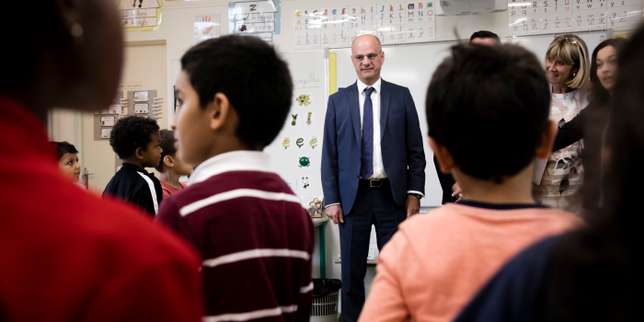
Not surprisingly, the first results of the evaluations of CP and CE1 are not good. “23 % of the students in the beginning of CP have difficulties to recognize letters and the sound they produce,” said Jean-Michel Blanquer in 20 Minutes, Sunday, October 14. The minister of national education has also put forward the figure of 30 % of children of CE1 that read ” less than 30 words per minute, while the national goal is 50 words “, while 49 % have difficulties in mental calculation. The ministry insisted in a statement on the concordance of these results with the international surveys on the level of French students.
This finding might have read was published on the eve of the presentation of the superior Council of education (CSE) of a bill ” for a school of trust “. “Our colleagues had up to last Friday night to return the results of their students,” recalls Stéphane Hook, secretary general of SE-UNSA. “While the minister was preparing to confront, on Monday, the fact that he did not consult anyone for this bill, the communication precipitated from these results gives a sense of urgency that would justify taking action without discussing it. “The CSE, whose opinion is only advisory, rejected on Monday evening the bill.
some also dispute the conditions for the award of these tests and the relevance of the national averages put forward by the minister. According to several observers that rely on the upwelling of ground, the teachers have played the game, but the instructions have not always been respected, creating differences between classes and sometimes in the classes themselves. “In some cases, the exercises were designed without regard for the fact that a student of early CP is hard to find on a page “, argues Stéphane Hook, by the SE-UNSA. “The teachers had to ensure that some of them had the finger on the correct picture. “You can imagine that, in other classes, teachers do not have.
Bad message
To Roland Goigoux, a specialist in reading at the university of Clermont-Ferrand, there are two weights, two measures between the communication of the minister for the public and one of the creators of the test to the teachers about the ” less than 30 words per minute, while the national goal is 50 words “. The goal at the end of CP, according to the booklet “to teach reading and writing in CP” sent to the spring in the schools, is well of 50 words per minute. But the “alert threshold” established by the ministry, beyond which it is considered that it is necessary to monitor a child, is 29 words. The threshold of the students in a situation of “fragile” is established, according to the study, around 11 or 12 words.
In the circle of specialists of the school learning, it is also the content of the evaluations that questions. In one of the exercises proposed in the beginning of CP, children have to surround (in a series of letters), which corresponds to the first sound of a word pronounced by the teacher, for example, the ” f ” in ” leaf “. “This requires being able to discriminate a sound at the beginning of a word, something that is not in the preschool program “, peak Roland Goigoux. For Franck Ramus, a researcher in cognitive sciences and member of the scientific Board of national education who designed the tests, if this exercise is in effect on skills that are not in the preschool program, ” it helps to know where each student is, and it is helpful for the teacher “.
It is precisely here that the shoe pinches : these tests were first presented as being intended for teachers. They are going to receive the detailed results of their students, as well as proposals of pedagogical resources adapted on the platform Eduscol. For Stéphane Hook, it sends a bad message. “Teachers are discovering through the press of the national results, whereas we had said that it was the pedagogical tools that were used. “
also Read : Jean-Michel Blanquer, the first of the class in Macronie
Was it right to publish the national averages of the results of these assessments ? For Stanislas Dehaene, neuroscientist and member of the scientific Board of national education, the results, interesting for large-scale researchers, are first and foremost tools for teachers. These specialists are expecting with impatience the tests of the mi-CP. “This is where we’ll see really the progression of the students and that we will be able to suggest tools remediation teachers for students who have difficulty learning to read,” says Franck Ramus.
against the backdrop of these results plays an other table : the fate of the Cnesco, the instance of independent evaluation of the school system, whose transformation into a new instance is foreseen in the draft law. However, the Cnesco’s role is to evaluate the methodology of international assessments and national. What, in the case of the tests of CP and CE1, it will probably not have time to do.
also Read : Cedric Villani : “We will not be able to heal the national education without assessments”
















